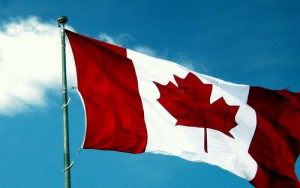This blog is part of the coursework for English 470A, a Canadian Literature class taught by Dr. Erika Paterson. We will be examining a number of interesting topics here, such as the power of stories, what it means to be Canadian, and the relationship between nation building and literature.
I’m Tarana, a fifth year English Lit Major at UBC and I’m really looking forward to taking this class. As a first generation Canadian, who is still figuring out her national identity, I’m sure this class will give me lots of new ideas to think about. I find the relationship between stories and national identity especially fascinating and I’m interested in examining it further. I came across this great quote a while ago that kind of touches upon these ideas:
“Stories are the secret reservoir of values: change the stories individuals and nations live by and tell themselves, and you change the individuals and nations.” – Ben Okri
It got me wondering – do we choose and select the stories we live by? Or are they always handed to us? Can we really change these stories and if so, how? I expect that by the end of this course, I’ll have a few answers.
Canada is known for being a ‘cultural mosaic’ – it’s been a part of our national policy since 1971 and I think it’ll be interesting to see to how this informs our literature and to what extent. We will probably also take a look at some of the more dominant narratives in Canadian Literature and I want to learn more about the ‘alternative’ narratives, the ones that have been pushed aside, forgotten or silenced.
Most of the literature classes I’ve taken so far have usually been about Victorian England, British Romanticism and poetry, so this course will be new – and exciting – territory for me. I look forward to learning with you all!
WORKS CITED
“Census: Ethnocultural Portrait: Canada.” Census: Ethnocultural Portrait: Canada. Statistics Canada, n.d. Web. 09 Jan. 2015.
“ENGL 470A (3 Cr): Canadian Studies: Canadian Literary Genres.” UBC Centre for Teaching Learning and Technology. University of British Columbia, n.d. Web. 09 Jan. 2015

Hello Tara, a great beginning, good to meet you and I look forward to your contributions to our course of studies. Your blogs looks great 🙂
Hi Tara! Great first blog post!
I can see you discuss Canada as often being defined as a “cultural mosaic”, but also recognize that there exist dominant narratives within Canada. America is often referred to as more of a “melting pot” and is defined as such because of the existence of a dominant group whose norms and lifestyles become representative of a hegemonic ideal that ought to be emulated by minority groups. Conversely, however, the term cultural mosaic implies the existence of a plurality of cultures existing in harmony and respecting the differences and uniqueness of each culture. Some individuals might argue that despite having an official multiculturalism policy, Canada’s cultural mosaic is just national mythology and illusion, and ideals of normativity and supremacy favouring a dominant group are more pervasive in Canadian society than the national narrative leads one to believe. I’m just curious to know what your opinion on the debate is and whether or not you agree with the label of Canada as a cultural mosaic or lean more towards the view that this is simply national mythology.
I hope my question makes sense! I’m looking forward to your response! 🙂
Hi Shamina,
Good question! One I was thinking about as I wrote this post actually. Is Canada’s ‘Cultural Mosaic’ what Chamberlin calls ‘legal fiction’? I don’t think I have an absolute answer as to which side I lean towards more. I do feel that this notion of a cultural mosaic does truly let people retain and celebrate their culture– for example, almost every cultural group has a city wide festival celebrating their traditions in Vancouver and I think this is amazing as people feel connected or a sense of belonging to the place they are in – Canada – through the medium of their own stories/tradition. But on the other hand, like you said, I do also recognize that there are dominant narratives in Canada – in literature particularly. In high school, I remember reading Margaret Atwood and the like, with ‘Obasan’ thrown in the mix. But I can’t recall learning about any indigenous narratives…. What do you think? Which view do you find yourself leaning towards more?
Hey Tarana,
Just wondering if you would be interested in being in a group with Jessica Ramsey and I (and potentially, Caitlin Funk).
Let me know!
Jessica P